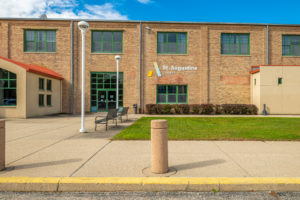Artes culinarias – St. Augustine College
AAS, Artes culinarias
El plan de estudios de nuestra Tecnicatura en ciencias* con concentración en Artes culinarias está diseñado para proporcionarte la experticia necesaria para ingresar a la industria de los servicios de comidas o los restaurantes en un puesto de nivel medio. Completar este riguroso programa de estudios de 60 horas crédito te califica para empleos en hoteles, restaurantes, hospitales, bares al paso, hogares de retiro y otros lugares.
Los requisitos para este título incluyen 16 horas crédito para educación general, 4 horas crédito para cursos de apoyo y 40 horas crédito para cursos de especialización. Tu estudio en el mundo de las artes culinarias incluirá teoría y práctica, así como la oportunidad de recibir tu certificado sanitario, imprescindible para trabajar en este campo.
Empoderado para el éxito
Como graduado del programa de la carrera de AAS en Artes culinarias*, estarás preparado para lo siguiente:
- Comprender conceptos centrados en las técnicas, los procedimientos, los estilos y los servicios culinarios.
- Aplicar conocimientos y mostrar competencia en especificaciones y categorías culinarias, así como estructurar habilidades de organización.
- Aplicar técnicas básicas y avanzadas de preparación de alimentos a las habilidades culinarias.
- Demostrar la manipulación y el uso seguros de alimentos, equipos de cocina y herramientas.
* La educación general básica de esta carrera cumple con pautas de la Iniciativa de Articulación de Illinois (IAI).
View Full Course List
| Associate of Applied Sciences in Culinary Arts - Academic Requirements | CREDIT HOURS REQUIREMENTS | |
|---|---|---|
| REQUIREMENTS | CREDIT HOURS | |
| General Education Requirements | 16 HRS | |
| ENG 160 Composition I | (4) | |
| ENG 162 Composition II | (4) | |
| HIS 104 Survey of U.S. History to 1865 OR HIS 105 Survey of U.S. History from 1865 to Present OR PSC 103 American Government and Politics | (4) | |
| PSY 101 General Psychology | (4) | |
| Support Course Requirements | 4 HRS | |
| CIS 109 Computer Apps for Culinary Arts | (2) | |
| MAT 109 Mathematics for Culinary Arts | (2) | |
| SAN 025 Food Service Sanitation Manager Certification | ||
| Major Requirements | 32 HRS | |
| BUS 110 Introduction to Business | (4) | |
| CUL 100 Food Service & Hospitality | (4) | |
| CUL 101 Introduction to Culinary Arts | (4) | |
| CUL 104 Garde Manger | (4) | |
| CUL 105 Baking and Pastry I | (4) | |
| CUL 106 Principles & Production of Stocks Soups, & Sauces | (4) | |
| CUL 108 Fish, Shellfish, & Poultry I | (4) | |
| CUL 201 Culinary Principles & Meats | (4) | |
| Recommended Electives | 8 HRS | |
| CUL 103 Nutrition | (4) | |
| CUL 120 Baking and Pastry II | (4) | |
| CUL 125 Baking and Pastry III | (4) | |
| CUL 231 Adv. Culinary Skills | (4) | |
| CUL 232 Externship & Internship Rotation | (4) | |
| CUL 240 Latin American Cuisine | (4) | |
| CUL 244 European Cuisine | (4) | |
| TOTAL CREDIT HOURS/COURSES | 60 HRS | |









